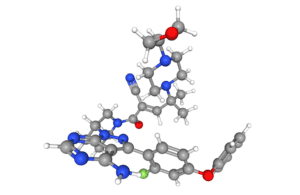
[Rilzabrutinib image courtesy of PubChem]
Patients with ITP, an autoimmune disease that involves increased platelet destruction, have often complained of fatigue, problems with cognition and other symptoms that physicians have dismissed, according to Dr. David Kuter, the director of clinical hematology at Massachusetts General Hospital, professor of medicine at Harvard Medical School, lead author of the NCT03395210 study. “What’s relevant about this study is that it is probably the first time that we’ve done real testing on patients to demonstrate there is a defect in ITP patients in terms of their cognition,” Kuter said.
The topic of cognitive impairment in ITP has been a point of discussion for years. But the study could mark the first time data quantitatively shows the extent of cognitive dysfunction in this patient population.
Over the years, many physicians taking care of ITP patients have recognized the cognitive impairment that can accompany the disorder but have struggled to characterize it. “We now have some tools available to us and let us measure this and show that it’s not a small problem,” Kuter said.
More about Sanofi’s rilzabrutinib study
Researchers administered the Cogstate Brief Battery to participants. The Cogstate Brief Battery includes psychomotor function, attention, visual learning and working memory tests. Investigators in the study administered the tests in the battery and compared the results to age-matched normative data to yield a standardized score (Z-score).
“What’s striking about this study is a sizable percentage of the patients — over half — had significant cognitive impairment,” Kuter said.
When the researchers applied statistical analysis, they found some patients with one standard deviation — and in some situations, almost two standard deviations — of variance from the norm. “You’re talking about real differences,” Kuter said.
To illustrate the scope of difference, Kuter points to bone density studies, which also use a z-score. “When a Z score is less than two standard deviations from the norm, that’s considered osteoporosis — major disease from a bone density point of view,” Kuter said. Conversely, in osteopenia, which involves low bone density but falls short of major disease, the standard deviation is below 1.
Study could help pave way for future ITP research
The majority of patients in the rilzabrutinib study had ITP for three or more years. That fact “brings up some covariables which are hard to assess,” Kuter said. The question is whether better up-front treatment could have prevented cognitive dysfunction. “Is this a cumulative damage that’s going to get better? Or is it damage related to some other aspect of the disease, which will be reversible?” Kuter asked.
Prior studies suggest that a low platelet count affects neurotransmitters. “Your platelets are full of serotonin, and serotonin-related drugs are used to treat depression,” Kuter said. It is thus possible that the cognitive dysfunction is a transient effect of a low platelet count. “All of the patients that were studied had low platelet count, so that would make you more optimistic that if you raise the platelet count and provide more serotonin, for example, in the brain, you might have an improvement in function.”
The second question is whether patients who had ITP for many years had some sort of cumulative damage associated with cognitive dysfunction. “Or does it happen every time someone’s platelet count drops, even for a couple of weeks?” Kuter asked
“The big question is: If you treat the ITP and make the platelet counts go up, does that reverse this cognitive dysfunction?”
Future analyses of the rilzabrutinib study may shed light on that question, given that they underwent subsequent cognitive function studies after they were treated with rilzabrutinib and had higher platelet counts. “So we look forward to analyzing the data and seeing whether the cognitive function increased or not,” Kuter said.
Filed Under: clinical trials, Drug Discovery, Hematology, Neurological Disease





Tell Us What You Think!
You must be logged in to post a comment.